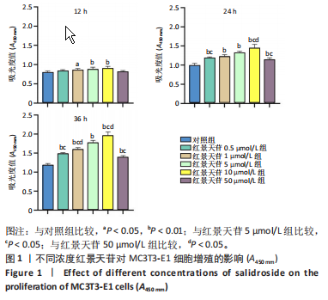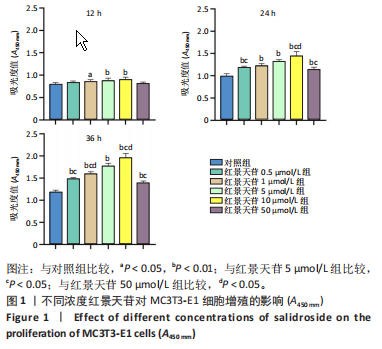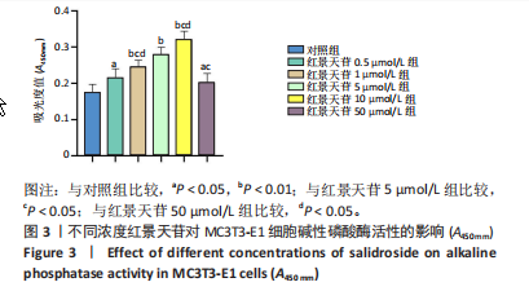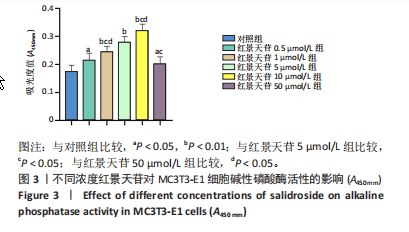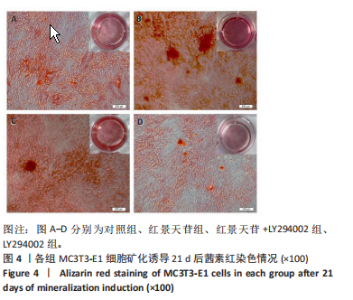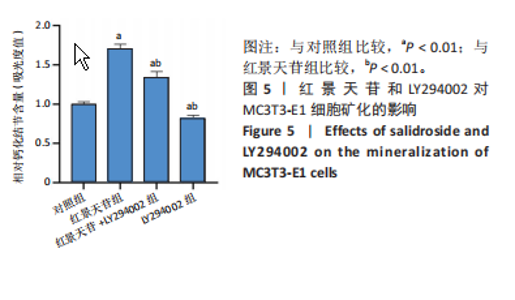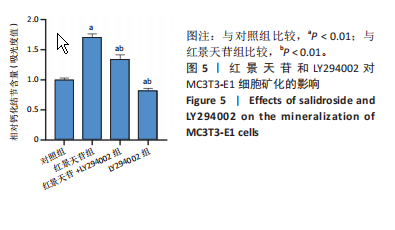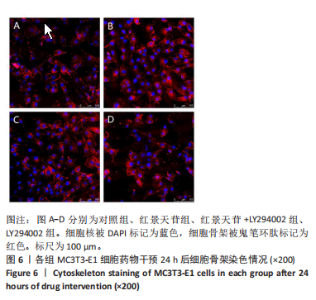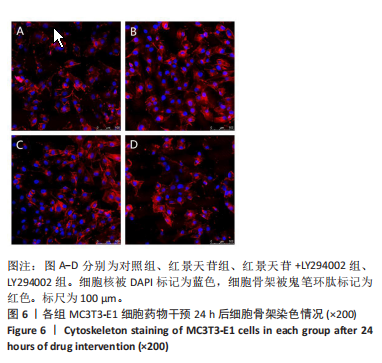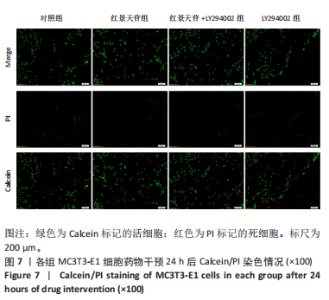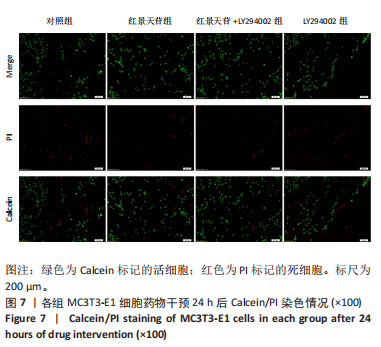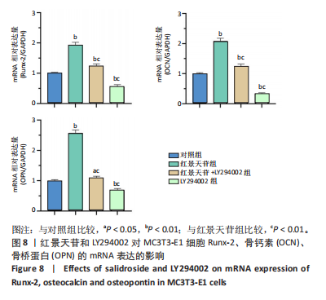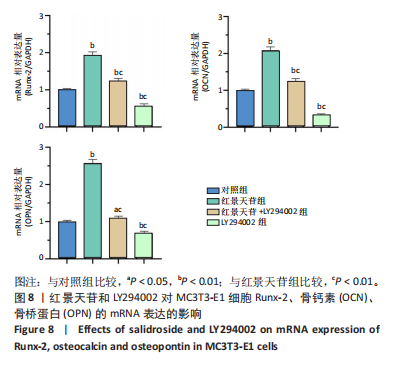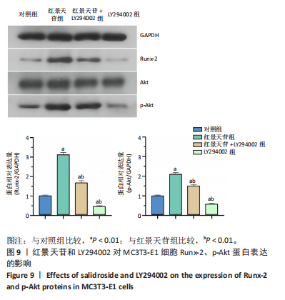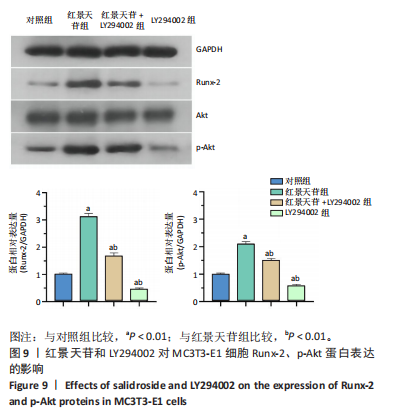Chinese Journal of Tissue Engineering Research ›› 2025, Vol. 29 ›› Issue (2): 231-237.doi: 10.12307/2025.207
Previous Articles Next Articles
Salidroside promotes osteogenic differentiation of MC3T3-E1 cells: an in vitro experiment
Liu Zhaohui1, Han Xiaoqian1, Duan Xin2, Guo Pengda1, Zhang Yuntao1
- 1Department of Stomatology, Affiliated Hospital of Binzhou Medical University, Binzhou 256600, Shandong Province, China; 2Maternal and Child Health Hospital of Linshu County, Linyi 276700, Shandong Province, China
-
Received:2023-12-16Accepted:2024-02-04Online:2025-01-18Published:2024-05-23 -
Contact:Zhang Yuntao, Master, Associate professor, Department of Stomatology, Affiliated Hospital of Binzhou Medical University, Binzhou 256600, Shandong Province, China -
About author:Liu Zhaohui, Master candidate, Department of Stomatology, Affiliated Hospital of Binzhou Medical University, Binzhou 256600, Shandong Province, China -
Supported by:2020 Shandong Provincial Postgraduate Enhancement Program for Professional Degree, No. SDYAL20202 (to ZYT)
CLC Number:
Cite this article
Liu Zhaohui, Han Xiaoqian, Duan Xin, Guo Pengda, Zhang Yuntao. Salidroside promotes osteogenic differentiation of MC3T3-E1 cells: an in vitro experiment[J]. Chinese Journal of Tissue Engineering Research, 2025, 29(2): 231-237.
share this article
Add to citation manager EndNote|Reference Manager|ProCite|BibTeX|RefWorks

不同浓度红景天苷培养细胞12,24和36 h后,可见红景天苷对MC3T3-E1细胞的增殖有促进作用。12 h时,促增殖作用最强的红景天苷10 μmol/L组吸光度值与红景天苷5 μmol/L及50 μmol/L组无明显差异;而24 h及36 h时,红景天苷10 μmol/L组的吸光度值与红景天苷5 μmol/L及50 μmol/L组的差异有显著性意义(P < 0.05)。由此认为,红景天苷10 μmol/L为促进MC3T3-E1细胞增殖的最适宜浓度。 2.1.2 碱性磷酸酶活性测定 见图2,3。不同浓度红景天苷培养细胞7 d后,可见红景天苷对MC3T3-E1细胞的分化有促进作用,并能促进碱性磷酸酶的分泌。在所选红景天苷浓度梯度中,红景天苷10 μmol/L组对MC3T3-E1细胞的促分化作用最强,且与红景天苷5 μmol/L及50 μmol/L组比较差异有显著性意义。通过不同浓度红景天苷对MC3T3-E1细胞增殖、分化作用的测定及对比,选取10 μmol/L作为后续实验中红景天苷的作用浓度。 "
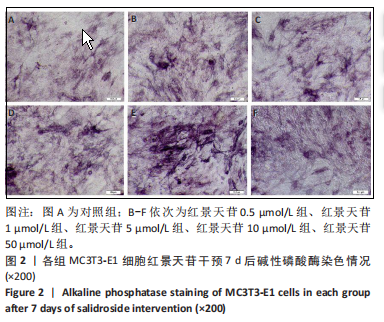
| [1] PENG K, ZHOU Y, DAI Y, et al. The effect of denture restoration and dental implant restoration in the treatment of dentition defect: a systematic review and meta-analysis. Ann Palliat Med. 2021;10(3): 3267-3276. [2] DOONQUAH L, HOLMES PJ, RANGANATHAN LK, et al. Bone Grafting for Implant Surgery. Oral Maxillofac Surg Clin North Am. 2021;33(2): 211-229. [3] CAROSI P, LORENZI C, LIO F, et al. Short implants (</=6mm) as an alternative treatment option to maxillary sinus lift. Int J Oral Maxillofac Surg. 2021;50(11):1502-1510. [4] LEBLEBICIOGLU B, TATAKIS DN. Complications following alveolar ridge augmentation procedures. Periodontol 2000. 2023;93(1):221-235. [5] STEFANINI M, RENDON A, ZUCCHELLI A, et al. Avoiding errors and complications related to immediate implant placement in the esthetic area with a mucogingival approach. Periodontol 2000. 2023;92(1):362-372. [6] LAIRD NZ, ACRI TM, TINGLE K, et al. Gene- and RNAi-activated scaffolds for bone tissue engineering: Current progress and future directions. Adv Drug Deliv Rev. 2021;174:613-627. [7] NGUYEN MP, VALLIER HA. What’s New in Orthopaedic Trauma. J Bone Joint Surg Am. 2021;103(13):1159-1165. [8] ZHANG X, XIE L, LONG J, et al. Salidroside: A review of its recent advances in synthetic pathways and pharmacological properties. Chem Biol Interact. 2021;339:109268. [9] CHEN JJ, ZHANG NF, MAO GX, et al. Salidroside stimulates osteoblast differentiation through BMP signaling pathway. Food Chem Toxicol. 2013;62:499-505. [10] CHEN X, CHEN W, AUNG ZM, et al. LY3023414 inhibits both osteogenesis and osteoclastogenesis through the PI3K/Akt/GSK3 signalling pathway. Bone Joint Res. 2021;10(4):237-249. [11] YOU WL, XU ZL. Curculigoside promotes osteogenic differentiation of ADSCs to prevent ovariectomized-induced osteoporosis. J Orthop Surg Res. 2021;16(1):279. [12] 梅国华, 郭小芹, 陈京京, 等. 红景天苷对成骨细胞的作用及相关分子机制研究[J].口腔医学研究,2017,33(9):916-919. [13] 赵宁, 于洪丹, 冯珍, 等. 红景天苷抑制高糖诱导大鼠视网膜Müller细胞的凋亡[J]. 中国组织工程研究,2021,25(11):1664-1669. [14] MARTIN-DEL-CAMPO M, ROSALES-IBANEZ R, ROJO L. Biomaterials for Cleft Lip and Palate Regeneration. Int J Mol Sci. 2019;20(9):2176. [15] HEGGIE AA. Craniofacial disorders. Aust Dent J. 2018;63 Suppl 1: S58-S68. [16] FU S, YAN M, FAN Q, et al. Salidroside promotes osteoblast proliferation and differentiation via the activation of AMPK to inhibit bone resorption of knee osteoarthritis mice. Tissue Cell. 2022;79:101917. [17] ZHENG H, QI S, CHEN C. Salidroside Improves Bone Histomorphology and Prevents Bone Loss in Ovariectomized Diabetic Rats by Upregulating the OPG/RANKL Ratio. Molecules. Molecules. 2018; 23(9):2398. [18] 易清清, 梁鹏晨, 孙苗苗, 等. 红景天苷抑制破骨细胞分化和极化的初步研究[J]. 天津医药,2022,50(3):236-240. [19] WANG Y, LI X, LIU Y, et al. Effect of MC3T3 cell density on osteoclastic differentiation of mouse bone marrow cells. Tissue Cell. 2022;75:101724. [20] LIU Y, ZHAO L, HE X, et al. Jintiange proteins promote osteogenesis and inhibit apoptosis of osteoblasts by enhancing autophagy via PI3K/AKT and ER stress pathways. J Ethnopharmacol. 2023;311:116399. [21] SUN X, HUANG LY, PAN HX, et al. Bone marrow mesenchymal stem cells and exercise restore motor function following spinal cord injury by activating PI3K/AKT/mTOR pathway. Neural Regen Res. 2023; 18(5):1067-1075. [22] ZHAO R, TAO L, QIU S, et al. Melatonin rescues glucocorticoid-induced inhibition of osteoblast differentiation in MC3T3-E1 cells via the PI3K/AKT and BMP/Smad signalling pathways. Life Sci. 2020;257:118044. [23] SCHINI M, VILACA T, GOSSIEL F, et al. Bone Turnover Markers: Basic Biology to Clinical Applications. Endocr Rev. 2023;44(3):417-473. [24] RECKELKAMM SL, HANNEMANN A, KOCHER T, et al. Association between bone turnover markers and periodontitis: A population-based cross-sectional study. J Clin Periodontol. 2022;49(7):633-641. [25] WANG L, YOU X, RUAN D, et al. TET enzymes regulate skeletal development through increasing chromatin accessibility of RUNX2 target genes. Nat Commun. 2022;13(1):4709. [26] XU HJ, LIU XZ, YANG L, et al. Runx2 overexpression promotes bone repair of osteonecrosis of the femoral head (ONFH). Mol Biol Rep. 2023;50(6):4769-4779. [27] KOMORI T. Functions of Osteocalcin in Bone, Pancreas, Testis, and Muscle. Int J Mol Sci. 2020;21(20):7513. [28] DONG M, SUN Q, YU X, et al. OPN N-glycosylation promoted bone destruction. Oral Dis. 2023;29(5):2154-2162. [29] FUJITA T, AZUMA Y, FUKUYAMA R, et al. Runx2 induces osteoblast and chondrocyte differentiation and enhances their migration by coupling with PI3K-Akt signaling. J Cell Biol. 2004;166(1):85-95. [30] CHEN Y, HU Y, YANG L, et al. Runx2 alleviates high glucose-suppressed osteogenic differentiation via PI3K/AKT/GSK3beta/beta-catenin pathway. Cell Biol Int. 2017;41(8):822-832. [31] DALLE CL, INNAMORATI G, VALENTI MT. Transcription factor Runx2 and its application to bone tissue engineering. Stem Cell Rev Rep. 2012;8(3):891-897. [32] LIN L, SHEN Q, LENG H, et al. Synergistic inhibition of endochondral bone formation by silencing Hif1alpha and Runx2 in trauma-induced heterotopic ossification. Mol Ther. 2011;19(8):1426-1432. |
| [1] | Zhao Ruihua, Chen Sixian, Guo Yang, Shi Lei, Wu Chengjie, Wu Mao, Yang Guanglu, Zhang Haoheng, Ma Yong. Wen-Shen-Tong-Du Decoction promoting spinal cord injury repair in mice [J]. Chinese Journal of Tissue Engineering Research, 2025, 29(6): 1118-1126. |
| [2] | Li Mingzhe, Ye Xiangling, Wang Bing, Yu Xiang. Preparation and osteogenic properties of liquid crystal display light-cured polylactic acid scaffold loaded with nano-tantalum [J]. Chinese Journal of Tissue Engineering Research, 2025, 29(4): 670-677. |
| [3] | Zhao Zengbo, Li Chenxi, Dou Chenlei, Ma Na, Zhou Guanjun. Anti-inflammatory and osteogenic effects of chitosan/sodium glycerophosphate/sodium alginate/leonurine hydrogel [J]. Chinese Journal of Tissue Engineering Research, 2025, 29(4): 678-685. |
| [4] | Lin Xiaohui, Yang Mengyuan, Li Chunnian. Role and mechanism of biomimetic remineralization therapy for early enamel demineralization [J]. Chinese Journal of Tissue Engineering Research, 2025, 29(4): 856-865. |
| [5] | Li Tingyue, Guo Qian, He Wenxi, Wu Jiayuan. Long noncoding RNA TP53TG1 promotes odontogenic and osteogenic differentiation of stem cells from the apical papilla [J]. Chinese Journal of Tissue Engineering Research, 2025, 29(36): 7776-7782. |
| [6] |
Li Yunzhe, Niu Zefan, Wang Zirou, Ai Chongyi, Chen Gang, Wang Xinxing.
Asperosaponin VI promotes osteogenic differentiation of MC3T3-E1 cells under hypoxia environment #br#
#br#
[J]. Chinese Journal of Tissue Engineering Research, 2025, 29(35): 7481-7489.
|
| [7] | Wang Jingshuai, Zhang Xiaotong, Zhang Yange, Wan Zedong, Kong Lingwei, Cao Haiying, Jin Yu. Comparison of Mg-Li-Gd alloy and stainless steel intramedullary nail for fixation of femoral annular hemi-defects in rats [J]. Chinese Journal of Tissue Engineering Research, 2025, 29(34): 7261-7268. |
| [8] | Yin Hang, Song Kui. Effect of crocin hydrogel on chondrocytes and MC3T3-E1 cells [J]. Chinese Journal of Tissue Engineering Research, 2025, 29(34): 7293-7300. |
| [9] | Tang Haoxu, Liang Yingjie, Li Ce, Ding Penglin, Qian Minlong, Yuan Lingli. Deferoxamine alleviates the inhibitory effect of glucocorticoids on osteogenic differentiation [J]. Chinese Journal of Tissue Engineering Research, 2025, 29(32): 6821-6827. |
| [10] | Wang Zhaoyan, Wang Qian, Liu Weipeng, Yang Hui, Luan Zuo, Qu Suqing. Effect of fibronectin on differentiation of human neural stem cells into oligodendrocyte precursor cells [J]. Chinese Journal of Tissue Engineering Research, 2025, 29(31): 6661-6666. |
| [11] | Liu Haowen, Qiao Weiping, Meng Zhicheng, Li Kaijie, Han Xuan, Shi Pengbo. Regulation of osteogenic effects by bone morphogenetic protein/Wnt signaling pathway: revealing molecular mechanisms of bone formation and remodeling [J]. Chinese Journal of Tissue Engineering Research, 2025, 29(3): 563-571. |
| [12] | Zeng Yu, Xie Chengwei, Hong Yuanqi, Su Shenghui, Dong Xieping. In vitro angiogenesis and osteogenesis properties of copper-doped mesoporous bioactive glass [J]. Chinese Journal of Tissue Engineering Research, 2025, 29(28): 5941-5949. |
| [13] | Shi Chunrong, He Jiaxu, Deng Lishan, Wang Hailan, Zhao Aimin, Yu Yiling, Geng Haixia, Song Weijun. Application of graphene oxide in field of oral implant restoration [J]. Chinese Journal of Tissue Engineering Research, 2025, 29(28): 6118-6126. |
| [14] | Li Zeming, Zhang Yuntao, Wang Maolin, Hou Yudong. Role and mechanism of hypoxia-inducible factor 1 alpha regulating bone homeostasis in oral and maxillofacial diseases [J]. Chinese Journal of Tissue Engineering Research, 2025, 29(26): 5680-5687. |
| [15] | Cheng Xinqi, Shao Longhui, Shen Huaqiao, Liu Hongwei. Osteogenic and antibacterial effects of titanium alloy modified with copper-strontium binary doped calcium silicate coating [J]. Chinese Journal of Tissue Engineering Research, 2025, 29(22): 4639-4646. |
| Viewed | ||||||
|
Full text |
|
|||||
|
Abstract |
|
|||||
